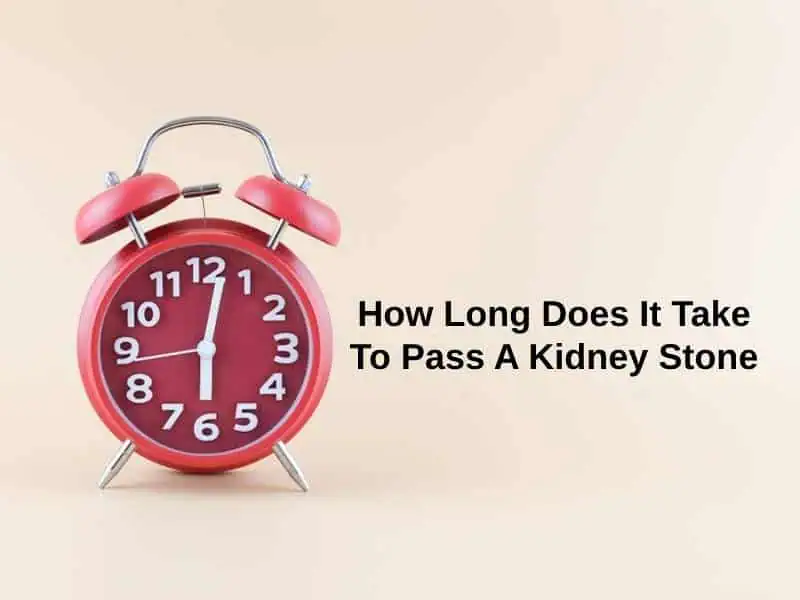Exact Answer: 2 Weeks
Health issues arise for anyone, anytime. When left unnoticed, they can get worse as days pass. It is always better to notice the health issues before they get worse. Noticing the issues before they get worse and treating them can always help. Prevention is better than cure, but not all health issues or diseases can be prevented or noticed. There are always symptoms to know more about the disease and ways to treat them. All one has to do, is visit the doctor and get diagnosed.
Among many diseases spreading around the world, some can be easily cured and treated. Various factors influence the disease and the recovery period. Sometimes the recovery period can just take days and weeks, but sometimes even months and years.
One of the most common illnesses that both women and men, of any age group can get, is kidney failure, and especially kidney stones.

How Long Does It Take To Pass A Kidney Stone?
| Size | Time |
| Smaller than 4mm | 1 to 2 weeks |
| Larger than 4mm | 2 to 3 weeks |
There are many vital organs in the human body. One among them is the kidneys. The kidneys remove urea and any other excess minerals from the body and blood. The kidneys belong to the excretory system and it normally excretes the waste products from the body through the urine. Not all the minerals get excreted out of the body through urine. Some minerals can be present in really large amounts and they form crystal-like stones called kidney stones.
There are two kidneys, yet a human can live a healthy life with even one kidney. Kidney stones can be formed in both kidneys. After that, they pass into the tube that connects the kidney and the bladder. Many symptoms will help one know if they have kidney stones. Blood in the urine, nausea, vomiting, pain in the back, side, and lower abdomen can let a person know if they have kidney stones.
Some kidney stones can be small or large, they can be the size of a chickpea, a grain of sand, or even the size of a ball. Some due to their small size can pass easily through the urinary tract, while larger ones cannot. Stones in the kidney are technically irregularly shaped solid mass and crystals in various forms. Even small stones exiting the ureter can cause great pain, while larger ones don’t even pass through the ureter.
Why Does It Take That Long To Pass A Kidney Stone?
Various factors influence the formation of kidney stones. People in their 30’s and 40’s are more susceptible to get kidney stones. The other risk factors include not drinking enough fluids, a diet that includes food with substances like phosphate, and many protein-rich foods that can lead to the formation of many stones. Having a family history of kidney stones, and blockage of the urinary tract can also be a great cause of kidney stones.
Certain medical conditions can even increase the risk of getting kidney stones. Kidney stones can pass through the ureter sometimes, but the process can be really painful. Any stone that is smaller than 4 mm can pass through within one to two weeks, but stones larger than 4 mm can take more than 2 to 3 weeks to pass completely.
Conclusion
As soon as the stones reach the bladder, they pass away within days or weeks based on the size. Although, the size, the age of the person, and various other factors also play a major role in the duration. The other conditions that increase the size of the stones and the possibility of ever getting the stones to include high blood pressure, obesity, diabetes, high calcium levels in urine, and even some surgeries and operations.
Some medicine can even increase the risk of getting stones. Kidney stones can be diagnosed by using imaging tests, urine tests, and even blood tests. After completing the diagnosis, if one is contradicted with kidney stones, there are many treatments to help one with the pain, nausea, and vomiting. Some medications will help one to relax their ureter so the stones can pass.
It is better to consult a physician when one is diagnosed with kidney stones, get medical consultation and undergo treatment.
References
- https://www.thelancet.com/journals/lancet/article/PIIS0140-6736(98)01295-1/fulltext?rss=yes&code=lancet-site
- https://www.nature.com/articles/nrdp20168